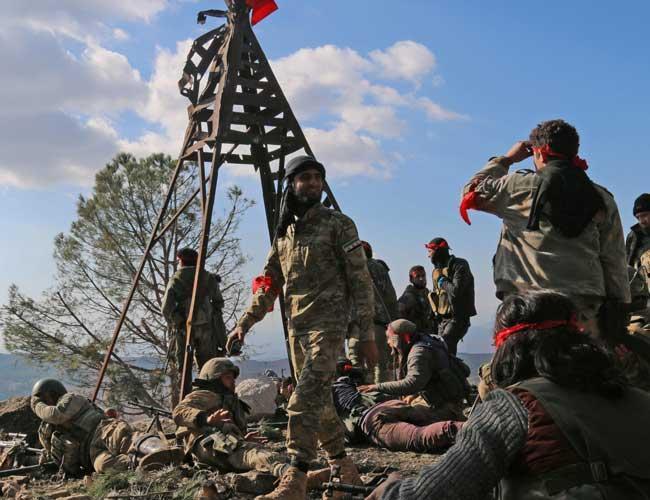
The U.S. is not supporting the People’s Protection Units (YPG) militants who leave the battle against the Islamic State of Iraq and the Levant (ISIL) to head to Afrin to fight against the Turkish military, Pentagon spokesperson Eric Pahon has told daily Hürriyet.
“Our relationship with the SDF is the counter-ISIS [ISIL] fight,” he said, using an acronym for the Syrian Democratic Forces, a U.S. ally on the ground dominated by the YPG.
“We cooperate with those units that are working to defeat ISIS. The units that have moved out or moved to Afrin are not U.S.-supported units,” he said.
Pahon also expressed U.S. hopes that only a “small amount of fighters” from the YPG have been moving from other parts of Syria to the Afrin region to counter Turkey’s “Operation Olive Branch,” which began on Jan. 20.
Turkey considers the YPG a terrorist group for its links to the Kurdistan Workers’ Party (PKK).
“Some of those people are from Afrin. Your home is attacked and you go back and defend it… And again, we have asked Turkey to limit the scope and time of this operation so we can maintain the pressure on ISIS,” Pahon said.
“You are talking about the YPG and the SDF as an umbrella unit but it is not that simple. Those forces are more like a loose federation instead of thinking like the U.S. army as a whole. They are a federation fighting under one command and one cause. If pieces of that fracture move out, we are not cutting our support for the SDF as a whole, it will be those individual pieces,” he said.
No intention to confront Turkey
Responding to a question on Turkey’s declared intention to expand the cross-border offensive to Manbij, a town controlled by SDF and U.S. forces, Pahon said: “We sure hope that the Turks won’t pass Afrin to Manbij. We are really concerned about this. It has a potential to derail this ISIS fight. It is a huge distraction from all of the work we have put in so far. We really want people to remain focused on the defeat of ISIS. We understand Turkey has these very serious concerns about the terrorism and terrorist groups near and on their borders. We are fully aware of that. We are working with Turkey as much as we possibly can but this operation has a big potential to distract from or to cause us to lose some of the gains we had against ISIS.”
When asked about the possibility of a clash between Turkish and U.S. troops, the spokesperson said: “Turkey is a key NATO ally. We are in discussions with Turkey. We have a [military] relationship since the mid-1950s. We have not had a clash with the Turkish forces and we hope to keep it that way. We intend that it will stay that way. We are talking to our Turkish counterparts at all levels of the government and we are walking through this.”
“The communication is ongoing. We are working on it. Diplomacy is always key in any kind of complex battlefield especially if the battlefield is as complex as Syria,” he also said.
Pahon also echoed U.S. Central Command (CENTCOM) Commander General Joseph Votel by saying they have no plans to leave Manbij.
“The Turks have been very very helpful in helping to de-escalate the situations. If there is any kind of clash or gunfire, it has been helpful to be able to communicate with the Turkish military,” he said about recent tensions between the SDF and other opposition forces backed by Turkey.
On a question about the relationship between the YPG and PKK, Pahon said: “The United States sees the PKK as a foreign terrorist organization. We understand, acknowledge Turkey’s concerns about the threat the PKK poses to Turkey. We are assisting Turkey in their operations against the PKK, their efforts to dismantle the PKK as an organization. The elements that we work with have been vetted. There has been a review before there was any kind of coalition training and support. There are a lot of aspects to this. We are working our best to reassure Turkey that we are there to help. On the SDF side of it we are thoroughly vetting our partners and keep the focus on ISIS.”